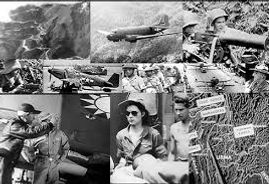
World War One SS.912.A.4.5
-
You will need to know the general causes of World War I, including how political alliances, imperialist policies, nationalism, and militarism each generated conflict in World War I.
-
You will need to know the reasons for United States involvement in World War I and how involvement in the war was justified to the American public.
-
You will need to know the cause-and-effect relationships that resulted in American intervention in World War I.
-
You will need to know the major events and issues that affected the home front.
-
You will need to know the role of technology and/or the concept of total war in World War I.
-
You will need to know the significant individuals and their role in military and/or political leadership during World War I.
-
You will need to know the dichotomy between the Fourteen Points and the Treaty of Versailles, which resulted in the failure of United States
-
support for the League of Nations.
-
You will need to know the short and/or long-term social, political, and/or economic consequences of World War I for the United States
-
and America’s role in international relations in the post-war period.
Terms to know include, but are not limited to:
African Americans in World War I, armistice, Big Four, entangling alliances, Espionage Act, Fourteen Points, Hispanics in World War I, home front,
imperialism, League of Nations, Lusitania, militarism, new technology in World War I, propaganda, reparations, Selective Service Act, Sussex Pledge, trench warfare, unrestricted submarine warfare, Treaty of Versailles, war bonds, women in World War I, Zimmermann Telegram.

Example One
A major purpose of President Woodrow Wilson’s Fourteen Points (1918) was to
a. ask Congress to enter World War I
b. set goals for achieving peace after World War I
c. provide an aid program for rebuilding war-torn nations
d. retaliate for the sinking of the Lusitania

Example Two
Henry Cabot Lodge and other senators opposed ratification of the Treaty of Versailles (1919) because they believed the treaty
a. failed to punish Germany for its involvement in World War I
b. excluded reparations for European allies
c. could draw the United States into future conflicts
d. placed blame for World War I on all the warring countries
Extract from ESCD-fl.schoolloop.com (2013)


